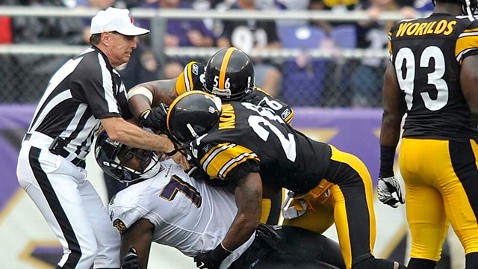NFL Brawl Leads to Ref's Cancer Diagnosis

Corrente said a Sept. 11 scuffle between the Baltimore Ravens and the Pittsburgh Steelers led to his throat cancer diagnosis. (Gail Burton/AP Photo)
Tony Corrente, a veteran referee for the National Football League, started a second round of chemotherapy for throat and tongue cancer Monday, two days after officiating Saturday's playoff game between the New Orleans Saints and the Detroit Lions.
Corrente recalled his fluke cancer diagnosis and his drive to keep working during treatment in an interview Monday with Sports Illustrated's Peter King.
It started with a brawl between the Baltimore Ravens and the Pittsburgh Steelers in the Sept. 11 season opener. Corrente, a high school social sciences teacher in La Mirada, Calif., stepped in to split up the scrum. Instead, the ref was pushed over, landing hard on his head and back. Feeling the pain after the game, Corrente, 60, was given the option of Tylenol or Motrin. He picked Motrin, a non-steroidal anti-inflammatory that also acts as a blood thinner.
In the days that followed, he began to cough up blood and was referred to a throat specialist who spotted the thumb-sized tumor.
"Getting knocked down and hurt in that Baltimore game might have saved my life," Corrente told King. "Had I not done anything, or had I taken Tylenol, which doesn't cause your blood to thin, I probably wouldn't have discovered this for a while. And by then, I'd have needed massive surgery, and who knows what chances I would have had."
Corrente started a seven-week stint of chemo and radiation therapy in October at MD Anderson Cancer Center in Houston that caused him to lose his hair and three weeks of work. But he was back in time for the Nov. 20 Baltimore-Cincinnati game, where he asked to speak to Michael Oher and Matt Birk, the Ravens from the fateful scrum.
"I told them, 'I just wanted to tell you that you actually may have saved my life,'" Corrente told King. "I could see they were shocked as I explained it. This crazy ref was thanking them because they knocked him on his butt."
Most throat cancers are detected when patients complain of voice changes, difficulty swallowing or palpable lumps on the neck. But coughing up blood can also be a symptom.
"This is an unusual way of being alerted to a diagnosis," said Dr. Edward Kim, chief of head and neck medical oncology at the MD Anderson Cancer Center. Kim was not involved in Corrente's care. "But there are all kinds of anecdotes like this in sports - fluky plays that lead to a diagnosis."
Because throat tumors tend to be spotted early (according to Kim, "there isn't enough real estate for the tumors to grow without causing symptoms"), the prognosis is usually good. But the aggressive treatments can take a toll. On top of chemo, Corrente is also undergoing radiation therapy, which will blister his throat, fade his voice and make it painfully difficult to swallow.
One of his doctors said, "We just scored a couple of runs, but we're only in the sixth inning , and the other guys have some good hitters coming up," Corrente told King.
Although he made it through Saturday's Saints-Lions game, Corrente said he felt weak and sore Sunday. He told King he's disappointed to be out for the rest of the playoffs, but added he's looking forward to next season and the chance to thank Ryan Mundy and LaMarr Woodley, the Steelers who accidently pushed him into treatment.
Kim said hunkering down at work can provide a much-needed distraction for people going through cancer treatment. "Whether you're a lawyer, an executive, an NFL ref or a secretary, one can only imagine how hard it is not to think about the diagnosis and the future," Kim said. "I do believe the more people can stay occupied and do things to keep busy and keep a positive attitude, it really goes a long way in helping them through the battle."
Corrente might have a tough road ahead. But based on his performance Saturday, Kim said the prognosis looks good. "I would expect him to be calling games next season," he said.